Where to Start With Juzo Itami is a short guide on…well…where to start with Juzo Itami! The idea behind this sort of guide is that sometimes you get interested in a particular film-maker, actor, writer, or creative figure and think “I would quite like to delve into this person’s work…” but have no idea where to start! The more work that person has created, the harder it becomes to know what to tackle first. This guide will (hopefully!) help with that. It’s not a list of my three favourite films by Juzo Itami, or his three most popular necessarily, but rather the three films I would recommend to someone to give them the most complete picture of Juzo Itami’s work, and what direction they should move in next (if they still want to!).
The Man: Juzo Itami
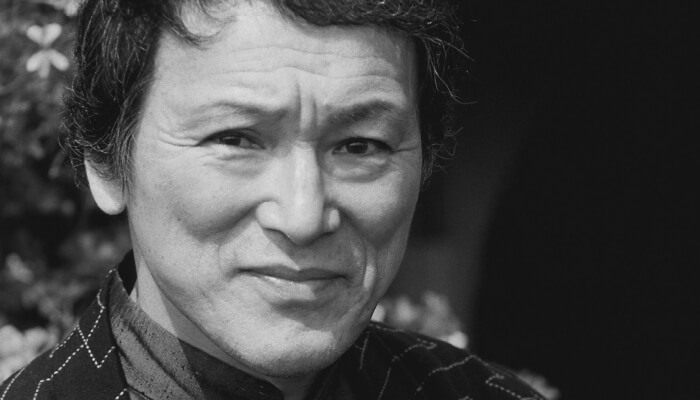
Before recommending where to start with Juzo Itami it seems best to first get to know a little bit about him. Born in 1933 to film director Mansaku Itami, Juzo Itami began acting in the 1960s gaining roles in both Japanese and American films, but not reaching the apex of his acting success until 1983, where his performances in The Family Game and The Makioka Sisters won him awards in Japan. It was around this time that he stepping into directing, releasing his first feature The Funeral in 1984 at the age of 50. He has said that he was reticent to become a director for many years given the shadow of his father’s success looming over him, being unsure if he would be able to live up to him. Thankfully, for all of us, he overcame those doubts, and directed a string of ten feature films, all of which he also wrote, from his debut in 1984 up until his untimely death in 1997.
Juzo Itami largely made satirical works, taking aim at various aspects of Japanese society, and in many cases based on his own experiences. The Funeral, for example, came to be after he noticed all the peculiar ceremonies, traditions, and strange dynamics present at the funeral of a relative he attended, remarking that it almost felt that he was part of a Yasujiro Ozu film. A Taxing Woman came following troubles he had with the Japanese tax system, and The Last Dance cast an eye on Japan’s healthcare system after he had a prolonged stay in the hospital.
Juzo Itami relied on a steady troupe of performers that he would cast over and over again throughout his films, and it’s fun to see these familiar faces pop in and out of his films as you work through them. However, it is impossible to mention the films of Juzo Itami without mentioning his wife and longtime collaborator Nobuko Miyamoto, whom he met on the set of Nagisa Oshima’s Sing a Song of Sex in 1967, and who he would go on to case in every single one of his feature films, seven times as the titular lead. Though she played a variety of different characters in his films, she was always independent, and always strong in her own way. There’s something incredibly endearing about Juzo Itami making films about these immensely capable, strong modern women of Japan, and always seeing his wife as the perfect person to play them all.
It would be easy to just tell you to start at the beginning and watch all ten of his features, but that’s not the point of this list! Now that we know a little bit more about the man, let’s get onto the first pick:
Tampopo (1985)
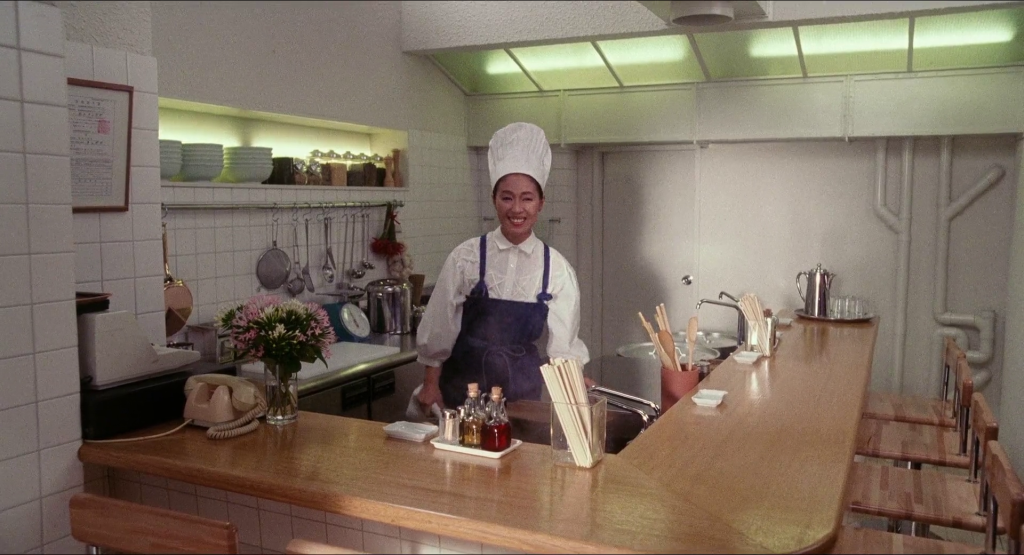
This is probably the obvious choice, but it’s also where most people do end up starting with Juzo Itami, so it seems impossible to start anywhere else. Tampopo was Itami’s second feature, and his most internationally successful one. Described as the first “ramen western”, the main story follows truck driver Goro (Tsutomo Yamazaki) and his apprentice Gun (Ken Watanabe) who make a stop for nourishment on a rain-filled night in a small run-down ramen bar owned by the widow Tampopo (played, of course, by Nobuko Miyamoto). Goro gives her honest feedback on her ramen (not great, but there is potential) and she begs him to teach her how to make great ramen. What follows is a quest to make the best possible bowl of ramen, and revive the fortunes of an ailing business.
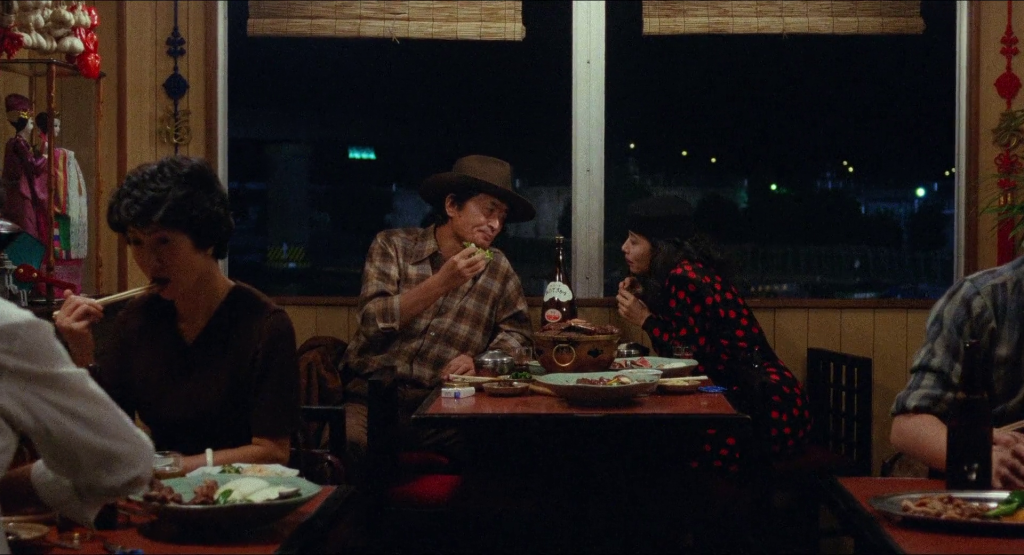
Interspersed with this main plot line are a number of small vignettes and asides about food and food-culture, presented in a way that’s almost indicative of the economic boom of the era: an abundance of choice, so much so that one turns from the main offering to take a look at everything else on offer, like channel surfing, or a sampler platter at a restaurant. The vignettes broach topics as broad as business, life, love, and death, all through our relationship to food. This smorgasbord approach is what makes Tampopo the perfect Juzo Itami film to start on: you can get a feel for his style in a variety of areas, and if you don’t like this one it’s unlikely you’ll get much from his later work. It also gives you a taste (sorry, couldn’t resist) of how Nobuko Miyamoto plays his leading lady, and hers is a face you’ll be seeing a lot more of if you continue down the Juzo Itami rabbit-hole…
Supermarket Woman (1996)
Having restricted myself to only picking three films for this list, it’s hard to decide what to leave out, or work out if things might overlap too much from one pick to the other. However, Supermarket Woman just fits right next to Tampopo incredibly well, albeit at the other end of the scale. While Tampopo explores food culture from all sorts of angles, and is constructed in a post-modern, channel-surfing way that fits the excess of consumer choice available at the height of Japan’s economic boom, Supermarket Woman is all about value. Released in the middle of Japan’s Lost Decade following the bursting of its economic bubble, the film is all about a failing local supermarket named Honest Mart, and the troubles it faces in light of the opening of Discount Demon, a new local rival supermarket with a focus on low prices.
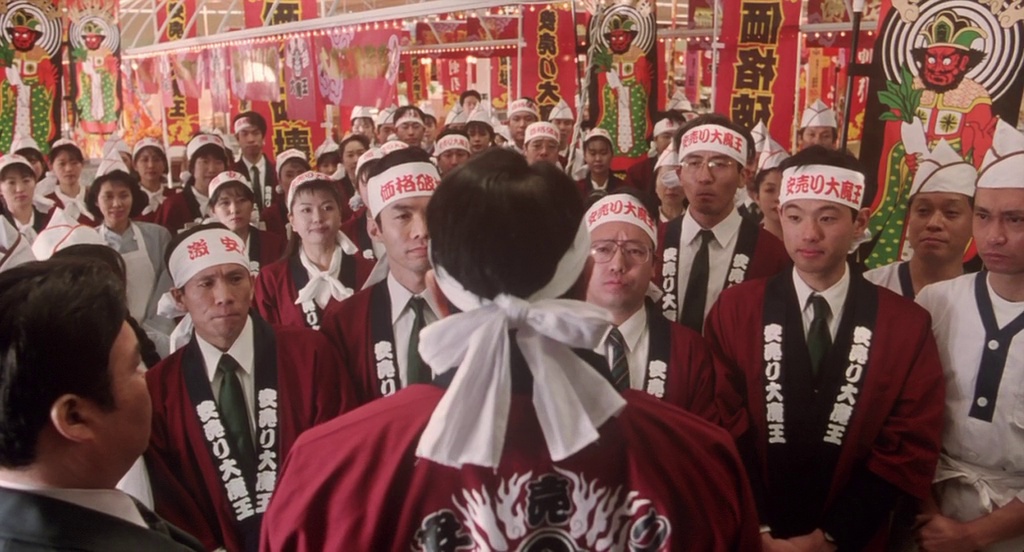
Honest Mart manager Goro (Masahiko Tsugawa, another Itami regular) visits Discount Demon on its opening day, wading through throngs of value-hungry customers, aghast at the low prices that could see his supermarket put out of business. In Discount Demon, he runs into Hanako (Nobuko Miyamoto, the titular Supermarket Woman), an old classmate who shares some insight on what shoppers want most from their local supermarket, and even visits Honest Mart with him so she can point out its shortcomings. Goro hires Hanako to help implement some radical new changes and turn Honest Mart’s fortunes around.
Juzo Itami made five films that all used a similar naming convention for their Japanese releases: the suffix “no Onna“. “Onna” is Japanese for “woman”, and the titular “Onna” is of course none other than Nobuko Miyamoto. Itami’s “Onna” in these films are strong, independent, and all have some unique trait or skill that mark them out as notable. In Supermarket Woman (Supa no Onna), Hanako’s skill is simple: She’s the typical supermarket shopper, a housewife, and her accumulated knowledge of what housewives want to make the most out of their shopping budget is what she uses to start implementing changes to make Honest Mart a much more appealing place for the customer who places value above everything else. This isn’t as simple as making prices as low as possible however, but in making the supermarket a place that fits their needs, a place that they can trust in matters of quality and convenience.
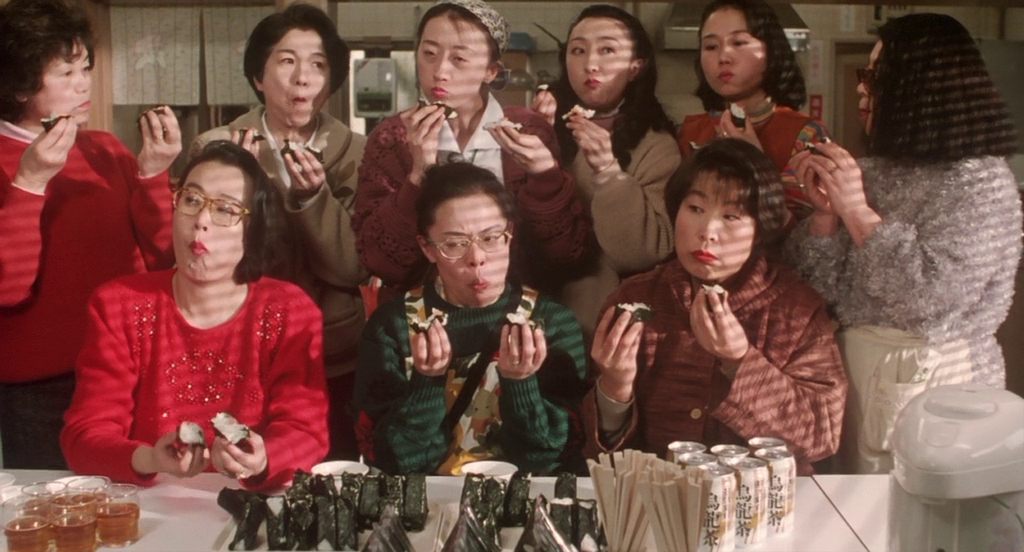
This focus on making Honest Mart customer-focused rather than profit-focused is what makes Supermarket Woman so interesting, for me. The way to make Honest Mart successful is not to make prices low and have flashy deals, like Discount Demon, but to change the way the business operates, to move away from costly artisanal goods and instead offer the things that your typical shopper will want, and to build trust between consumer and business. It’s a very rosy view of how capitalism should work, and it’s fun to see Hanako build alliances and cause friction with the various colourful characters that make up Honest Mart. Overall the film is very fun, it has subterfuge and even a high-speed chase, and it’s very satisfying to see Hanako implement her changes and watch as Honest Mart becomes the best supermarket it can be. As always, there is a satirisation of Japanese society of the time, taking aim at its resistance to change and reliance on “traditional” methods even when they patently do not work. I admit, it sounds like an odd thing to make a film about, but the end product is engaging, exciting, and endearing, as is usually case with Juzo Itami.
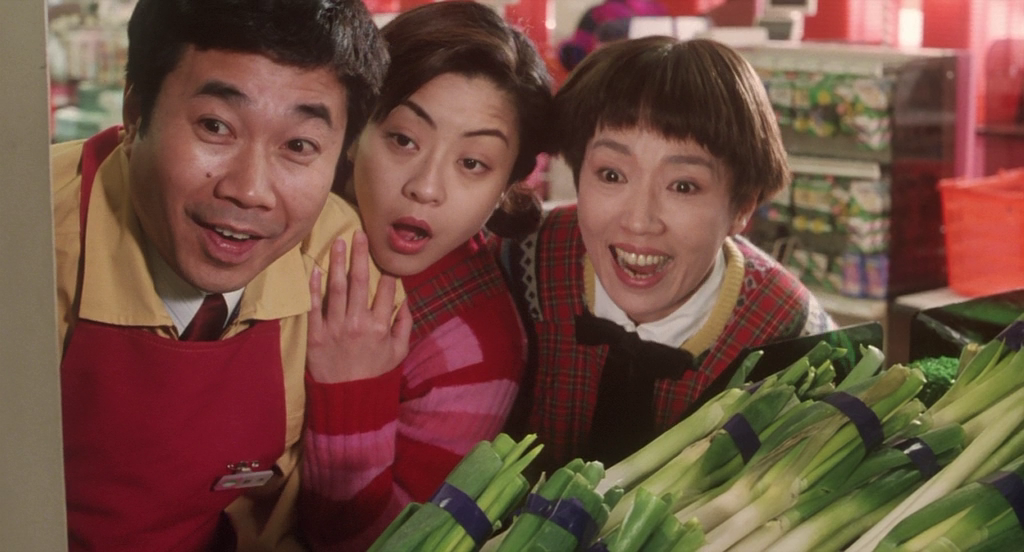
Minbo: The Gentle Art of Japanese Extortion (1992)
The last film I will recommend as a starting point for Juzo Itami is Minbo. Minbo is another of Itami’s “Onna” films, with Nobuko Miyamoto again playing the strong, smart, independent protagonist. In Minbo no Onna, Miyamoto’s character plays a lawyer who is an expert in handling the yakuza and their tactics of Minbo: a practice of extorting victims through intimidation and implied threats of violence rather than the more explicit criminal activity they had dealt in in the past. She is hired to rid a prestigious hotel of the yakuza who have identified it as an easy target and made it their new hunting grounds, causing trouble and even extorting money from hotel management itself. As an aside, it’s also worth mentioning that Nobuko Miyamoto always has absolutely fantastic hair in these Onna films, and Minbo is no exception.

Again Itami satirises Japanese culture, taking aim at the long-standing “institution” of the yakuza and the cultural expectation for Japanese to avoid confrontation at all costs. I have to admit, I’m not a great fan of yakuza films ordinarily. It feels like they’re often portrayed as some sort of noble order steeped in tradition rather than a group of criminals and murderers. That’s why I find Minbo so refreshing: rather than treating the yakuza with any reverence it instead depicts them as small-time, as little more than jumped up hooligans who make their living through being an intimidating nuisance. There aren’t any deep-rooted traditions being upheld and honoured, just the pursuit of money through underhanded means. Instead of focussing on the politics of the yakuza themselves, those interpersonal and hierarchical power-struggles to determine who should be “boss”, Itami shows the yakuza dealing in petty crime and intimidation. They plant a cockroach in a meal at a fancy restaurant then kick up a fuss, they “lose” a suitcase at a hotel and make veiled threats when it can’t be returned, they cause a nuisance and raise their voices at trivial matters in the hotel foyer. Essentially they just make themselves loud and visible and imply the only way to get rid of them is to pay them off. All of this just makes it all the more satisfying to see Minbo‘s yakuza eventually get their comeuppance, for their tactics to fall flat and fail.
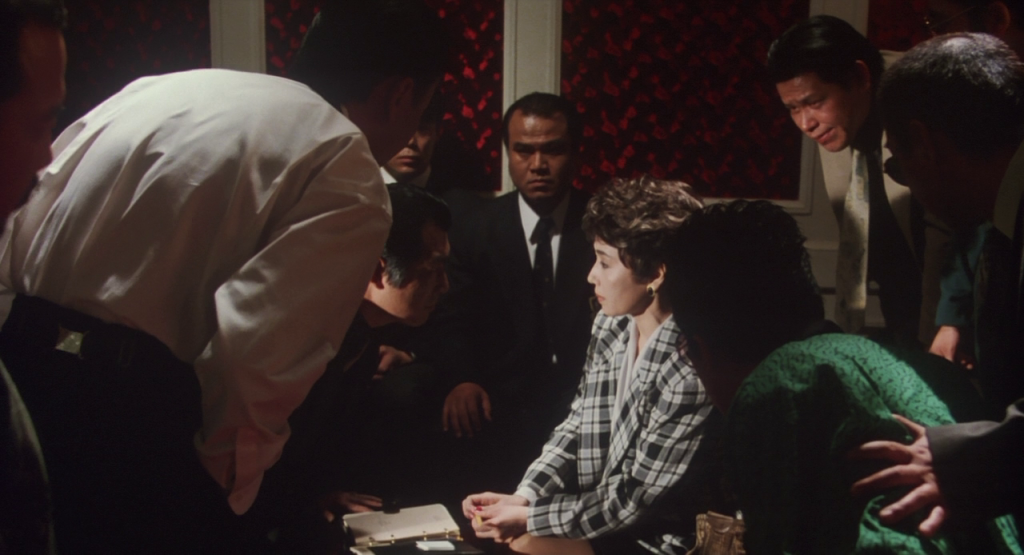
This was not a satire without danger however, as Itami would find to an eventually fatal cost. The yakuza were not happy with how they were depicted, and a group of them attacked Itami at his home shortly after the film’s release, briefly hospitalising him. Undeterred, Itami would continue to cast an unflattering light on criminal activity in his later work (most notably Woman in Witness Protection). Itami jumped from a tall building to his death in 1997. A death initially ruled as suicide, but later taken credit for by yakuza members, who forced him at gunpoint to jump or be shot. These events lend a certain sense of poignancy to any viewing of Minbo, knowing that even though Itami was threatened and even physically harmed because of the work he did and who his satire targeted, he would not let it compromise his artistic vision, and he was never scared off. To watch and appreciate his films today is just one way to thank him for his work, and I am forever grateful that he continued to share his vision with us to the very end.
What Next?
So perhaps you’ve now watched (and hopefully enjoyed!) these three films, the natural next question is “Which ones do I watch now?”
There are seven more feature films directed by Juzo Itami outside of the three I have recommended, so it’s not too difficult to just watch them all, however if I was going to recommend the next three best ones to move onto I would say: The Funeral (1984), A Taxing Woman (1987), and A Taxing Woman’s Return (1988).
I hope that this list has been helpful to you, and that you’ll soon be counting Juzo Itami among your favourite directors too!











